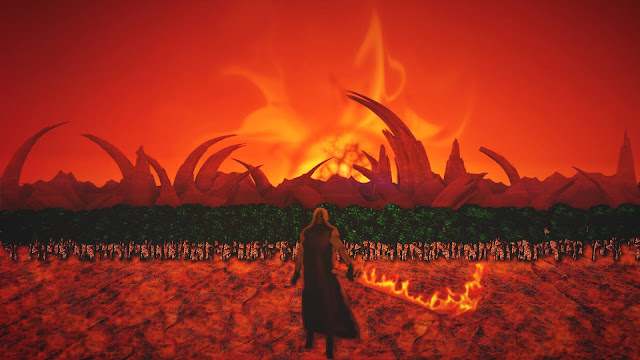Empyrean - Core System
- The Dice: This is how the dice functions:
- We have almost exclusively 12-sided dice in Empyrean.
- Each dice has the following potential results: Botch, Failure, Success, Critical Success.
- The Botch Number is 1. Botch counts as -1 success for the entire roll.
- Failure counts as 0 success. Success counts as 1 Success, and
- Critical counts as 2 successes.
- The Success / Target number determines the minimum result needed to score a success. So for a roll with 8+, any result of 8 or higher is a success (and any result between 2 and 7 is a failure).
- The Critical number determines the minimum result needed to score a critical. So for a roll with 10+, any result of 10 or higher is a critical is a critical, whilst any result between the critical number and the success number is a success, and any result other than those is a failure or a botch if that result is 1.
- Each roll is usually made by at least 2 dice while unmodified.
- The basic number of dice rolled is determined by the Aspect involved in the roll.
- The basic formula to calculate the number of dice is 1 + (Aspect Level / 2 - round up).
- Modifiers add or remove dice from rolls.
- In Empyrean the majority of rolls are opposed by other rolls. This is called a contest.
- The winner of the contest is the one to score the most successes.
- Any roll that is not a contest is called a test.
- Tests determine what constitutes a success on an individual basis. Some harder tests require critical successes only.
- Every contest is won by a success margin.
- The success margin is equal to Victor Successes - Enemy Successes.
- The success margin determines the actual amount of success... For example in combat it could determine the damage dealt.
- Generally speaking: More successes scored = better result.
- The Aspects. Aspects are not attributes. They are more like "classes". They don't develop further. In the core system, however, the Aspects double as Attributes as well. They still don't have some development mechanism.
- Force: The character's strength, courage, melee combat prowess, physical might, aggression, and ability to asset, and intimidate. Among other things Force is used to roll for melee combat, affects the player's ability to fight with heavy weapons, and the damage dealt in melee combat.
- Adeptness: The character's skill, agility, cunning, diplomacy, charm and wit. Adeptness is used to roll for ranged combat, dodge, evasion, and a slew of other actions. Players with Adeptness Level 5 or Level 4 can also use the martial aspect of Adeptness (Finessse) to substitute Force in melee combat, but have certain limitations to the types of weapons they can use and roll 1 dice less than normal.
- Fortitude: The character's stamina, resolve, endurance, tenacity, discipline, stoicism and self-control. Fortitude is used to roll to soak damage and resist various adverse effects. It also affects the player's ability to wear heavy armor. Players with Fortitude Level 5 or Level 4 can also use the martial aspect of Fortitude (Resolve) to substitute Force in melee combat, but have certain limitations to the types of weapons they can use (elegant and refined weapons are out of the question, in general), and roll 1 dice less than normal.
- Insight: The character's intelligence, perception, wisdom and other mental and emotional faculties, including empathy. It also affects the order of play during turn-based actions. Insight has no martial aspect, but drastically affects the player's knowledge, awareness and understanding of in-game information, and thus it often enables players with higher insight to participate more intimately into the ongoing story. It is also favored by occultists because it enables them to know and perform more arcane spells, but in the world of empyrean such knowledge may have side-effects when the power it taps to is non-trivial.
- Spirit: The character's virtue, inspiration, faith, ideals, moral and spiritual faculties. Also their link to the supernatural, the base of their willpower, and their ability to tap into the true, natural, mystical magic of the world. Spirit is exceptionally important to Empyrean characters, and it is recommended as one of the two highest aspects (Level 5 or Level 4).
- After determining what kind of character they are going to play, the players move on to prioritizing the 5 Aspects. The players have 5 levels to choose for their aspects. The Highest Aspect Level is 5. The Lowest Aspect Level is 1. According to the Aspect Level chosen, the players receive the following:
- Roll 2 dice. Success 8+. Critical 12.
- Roll 2 dice. Success 7+. Critical 12.
- Roll 3 dice. Success 7+. Critical 12.
- Roll 3 dice. Success 6+. Critical 11+.
- Roll 4 dice. Success 6+. Critical 10+.
- All players begin with Might 1. Players with Force Level 5 receive +2 Might, while those with Force Level 4 receive +1 Might.
- All players begin with 3 Health Levels: Bruised, Wounded, Crippled. Players with Fortitude Level 5 gain 2 extra Bruised Health Levels. Players with Fortitude Level 4 gain 1 extra Bruised Health Level.
- All players begin with 3 Movement. Adeptness Level 5 grants +2 Movement. Adeptness Level 4 grants +1 Movement.
- All players begin with 3 Willpower. Players with Spirit Level 5 gain 2 bonus Willpower. Those with Spirit Level 4 gain 1 bonus Willpower. Willpower can be spent temporarily by players to:
- Gain Inspiration (+1 dice bonus per developed Character Drive).
- Overcome some psychological impediment.
- Move up to your movement.
- React with a roll to some ongoing situation.



Comments
Post a Comment